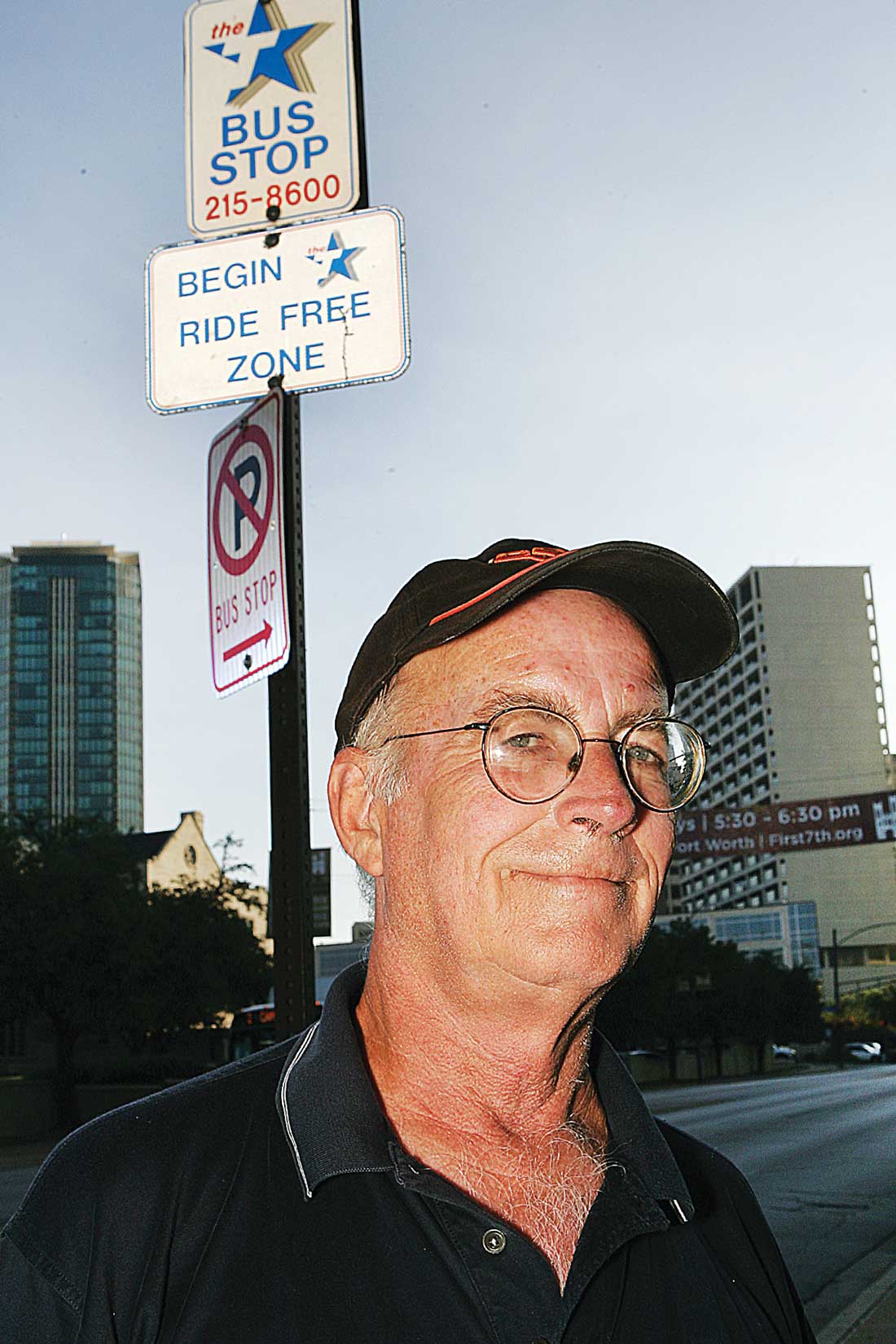On weekday mornings Lou Friese takes an hour-long bus ride to work from his West Fort Worth apartment near Las Vegas Trail. Before he found a job at First Street Methodist Mission in June, Friese had been homeless for more three years. The U.S. Coast Guard veteran depended on city shelters, faith-based organizations, and other social-service groups for food and shelter, but he never stopped looking for work. Were it not for the free bus passes he received from various nonprofit agencies, he said, he might still be on the streets, homeless and unemployed.
“I look at it like I was given a hand up, not a hand out,” he said. “Most of the people I know who were homeless treated those bus passes as gold.”
He used the passes to get to job interviews, medical appointments, and work after he got a job.
The Fort Worth Transit Authority, known as The T, gives the passes to 144 nonprofit organizations annually through a grant program called Fare Aid. Last year, The T handed out more than $300,000 worth of free bus passes and sold a significant number of additional passes at half price. The program was started in 1990 by United Way of Tarrant County, which funded it until 2005, when The T began shouldering the cost.
Last month The T announced it will end the program in October 2015, after the end of the agency’s fiscal year. That decision has upset advocates for the city’s homeless, who believe that The T made the decision unilaterally and without public input –– though none is required by law.
A letter to the grant’s recipients explained that The T is ending the program because “the lost revenue from the passes that are given away or sold at half price has affected The T’s ability to increase service on existing routes or expand bus services to areas that have no service.”
The T’s new president, Paul Ballard, has been on the job for five months. He told Fort Worth Weekly that his organization is focused on providing transportation for the city’s fast-growing population and can no longer afford to pay for the program and expand the T’s services.
“We are not a social-service agency, we are a transportation agency,” he said. “We provide public transportation to all of the residents in this area.”
He said he doesn’t believe that The T’s decision will affect the homeless — if social-service groups will pick up the tab for the passes.
“We don’t feel that it will have that much of an impact,” he said. “The social- service agencies put together budgets … and they just have to make sure they set aside some for transportation.”
Bruce Frankel, executive director of the Day Resource Center for the Homeless, said he understands The T’s need to get its fiscal house in order, but he thinks Ballard isn’t looking at the big picture.
“I also understand that The T is a member in what should be a community-wide collaboration addressing issues of homelessness,” he said.
More than six years ago, the city created a 10-year plan to end homelessness in Fort Worth. More recently the Tarrant County Homeless Coalition was awarded a federal grant to implement a two-year plan to end chronic homelessness. The city has made strides in addressing the problem, including by creating more low-income housing opportunities. Despite those efforts, the homeless population has risen by 13 percent in the last few years.
A key component of the city’s plan is to give low-income residents more access to free public transportation. Advocates for the homeless fear The T’s decision has thrown a serious wrench into that effort.
At a recent meeting of the city’s Advisory Commission on Ending Homelessness, many commissioners told Ballard they were concerned that The T wasn’t addressing one of the city’s main transportation issues: connecting low-wage, low-skill workers with employment opportunities.
“That’s how we grow the economy and keep people from becoming dependent in something as awful as homeless,” said Otis Thornton, the city’s homeless program director. “What is happening with the decision to cancel the Fare Aid program, [is that] the transportation problems for the poorest members of our community are being pushed back onto the shoulders of congregations and nonprofit organizations that are helping folks try to meet their most basic needs.”
Ballard, former head of transportation in Nashville, said his first priority is getting expenditures under control. The Fare Aid program, he said, was “way out of line for what is traditional for a transportation agency.
“We don’t have enough bus service on the streets of Fort Worth. It’s just not there, and we’ve got to do something to beef that up,” he said. “With all of the population growth anticipated in this area, we’re going to be completely choked with traffic, and we need to start working on it now.”
At the meeting, several commissioners questioned The T’s decision-making process. They asked why a project like Tex-Rail, which will go to Dallas/Fort Worth International Airport, takes precedence over the transportation needs of the poorest people in the community.
It costs just as much to run an empty bus as it does a full bus, homeless advocates pointed out, so they don’t see lost revenue as a reason for cutting the program. They also noted that The T has no plans to ax its “free zones,” in which people can hop on and off buses within a certain area of downtown without paying any fare.
“[The T] should be able to say, ‘OK, when the program goes away, this is how much increased revenue we expect to receive,’ ” Thornton said in an interview. “When he [Ballard] was asked that question, he said he was not aware of any revenue projections that have been made.”
Thornton said that many of the people at the meeting felt frustrated that The T is shifting the cost of bus passes onto nonprofit groups already heavily burdened.
He said The T is assuming that a nonprofit that spent $10,000 one year could spend $15,000 the next. “That’s just not the world we are living in,” he said.
Frankel, who said the Day Resource Center sees anywhere from 300 to 600 people a day, gives out about $13,000 worth of bus passes in a year.
“These passes become very valuable for people who don’t have a car, [enabling them] to go to medical appointments, be able to go for TB testing,” he said. “Without a way to get to a job, many of the people we place in housing would probably fall back into homelessness.”
He estimated that the bus pass program, which is significant in helping people find work and getting off social services, saves the city anywhere from $5,000 to $70,000 per person per year in services that don’t have to be delivered.
“For a small amount of money, this partnership has had a terrific return on investment, and I would hate to see it go away because it is such a valuable resource,” he said.
Frankel said his center, with an annual budget of less than $1 million, is planning for the worst and hoping for the best.
“There’s always a plan B and a plan C,” he said. “I’m hoping that over this next 12 months there will be plenty of opportunities to revisit that decision and work more collaboratively with all of the agencies that, up to this point, have been good community partners with The T.”













Thank you for allowing me to be featured in Mr Griffey’s article. The one point I want to emphasize that was not brought out in the article was the sense of accomplishment someone like myself feels, when after finding employment, being able to purchase His or her own bus pass. It brings a tremendous sense of relief, but also pride, to finally be able to not have to use this excellent program so that someone else could. Thanks again!